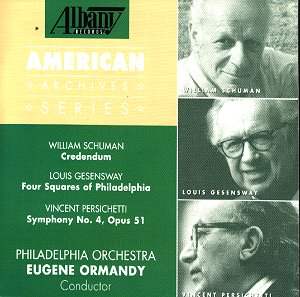
Gesensway's Four Squares is in six movements; not the expected four.
The four squares (Washington - colourful and bustling, Rittenhouse - warm,
Logan - slightly chilly as night falls and Franklin) are framed by a Prologue
and an Epilogue.
Gesensway, who was of Latvian extraction, is inevitably seen as trying to
do a Fountains of Rome for Philadelphia . The work differs from the
Respighi work in many ways. An orator appears in the prologue for a start
and in any event the music is not as compelling as the Respighi. The noble
sentiments of the prologue text give place to singers mimicking the mart
calls of the street traders. The music is light, colourful, amicable, eclectic,
pictorial, celebratory (Hispanic), over-extended in the case of Logan and
lightly popular in Franklin (night life: china town and jive). Overall it
is not specially memorable. It is perhaps a counterpart to Eric Coates Four
Centuries suite and George Lloyd's Charade Suite. It is the soft
centre of this disc but it is flanked by two symphonic statements.
The Schuman is not called a symphony but it has the architectonic 'feel'
of one. It is typically stark - almost statuesque. The fervour of the music
speaks of beliefs declaimed and longed-for certainties. The strings are typically
taut and high tensile. The music is nervy, convulsive, and of a steely
forward-surge. Credendum was written at the time of symphonies 7 and
8 and the violin concerto and it bears all the intensity of these works.
Classic Schuman. As with all the other pieces here one does not feel the
lack of stereo.
The Persichetti is in four movements. The first is drastically energetic
with multiple cross-references to the symphonies of William Schuman and Roy
Harris. It is influenced by Stravinsky and so is the cool andante (II) which
deploys a tune uncannily like the big theme from Andrzej Panufnik's Heroic
Overture. The Allegretto has the flowing grace of Roy Harris. The finale
Presto darts and flows with lambent vitality. It remains cool and
clear nicely mating together the attractions of the romantics and the
neo-classicists. The final brass shouted bars are clearly influenced by William
Schuman and, dare I say it, Kabalevsky (Colas Breugnon or was that
written later?).
John Proffitt's notes are reliable and satisfying. Another super-fine
contribution to Albany's 'American Archives Series'.
Reviewer
Rob Barnett

